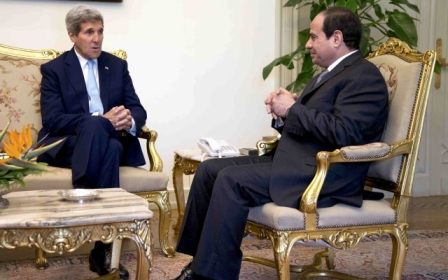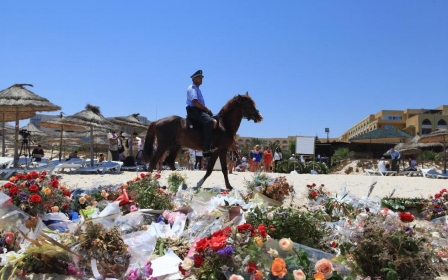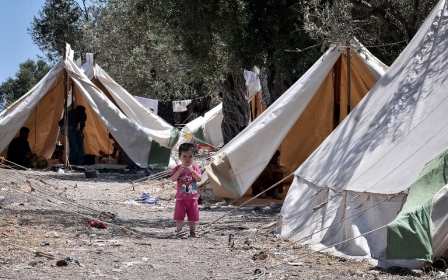Middle East states 'using anti-IS web war to stifle dissent'

UNITED NATIONS – Authoritarian governments in the Middle East are using the threat of Islamic State (IS) group propaganda as a pretext to clamp down on online criticism, according to Freedom House, the US-based democracy and civil liberties watchdog.
“Middle East autocrats have consolidated their hold on the internet, using terrorism as a new excuse to crack down on dissent in the wake of recent attacks by IS militants,” Adrian Shahbaz, the group’s regional expert, told Middle East Eye.
“A spate of new anti-terrorism laws around the region have overly broad definitions of terrorism that fail to distinguish between speech that incites violence or promotes extremism and the type of free speech posted by online journalists and human rights activists.”
Shocked by the fall of long-term leaders such as Egypt's Hosni Mubarak, Tunisia's Zine El Abidine Ben Ali and Libya's Muammar Gaddafi during the Arab Spring revolts of 2011, the region’s enduring autocrats clamped down on the activists who had used the internet to get protesters out onto the streets, said Shahbaz.
Since then, IS emerged in Syria and Iraq and launched an online campaign to draw recruits from overseas. According to the Brookings Institution, a US-based think tank, IS and its supporters ran some 46,000 Twitter accounts last year.
Egypt, Jordan, Morocco, Saudi Arabia, Tunisia and the United Arab Emirates (UAE) all responded with anti-terrorism laws aimed at countering the gruesome execution videos and other propaganda that IS spreads online, Shahbaz told MEE.
“They have a right to enact laws to ensure national security in the face of extremist bombings and shootings. But, in practice, these laws have been mistakenly applied to political opponents, government critics and investigative journalists,” he added.
In Egypt, he pointed to two journalists with Rassd, a pro-Muslim Brotherhood news website. Abdullah al-Fakharany, the executive director, and Samhi Mustafa, a co-founder, received life sentences in April after a crackdown on the Islamist group.
In August, President Abdel Fattah al-Sisi ratified a law that stipulates exorbitant fines for anyone who strays from government-approved statements and publishes “false” reports on attacks or security operations against militants.
In February, a court in Jordan sentenced Zaki Bani Rashid, deputy general of the Muslim Brotherhood in the country, to 18 months in jail for criticising the UAE on social media, after the Gulf country had listed the Brotherhood as a terrorist group.
He was convicted of “souring ties with a partner country”, an offence that was added to Jordan’s 2006 anti-terror law by an April 2014 amendment that defined disturbing Jordan’s foreign relations as terrorism.
“Perhaps the most absurd are the laws in the Gulf,” added Shahbaz.
“In the UAE, publicly declaring one’s animosity or lack of allegiance to the regime falls under the country’s broad definition of terrorism. Whereas in Saudi Arabia, the same applies to calling for atheist thought.”
Perhaps the most high-profile of the region’s online dissidents is Raif Badawi, a Saudi blogger who was sentenced to 10 years in jail and 1,000 lashes for “insulting Islam”. He received the first 50 lashes in public in January.
Badawi has been imprisoned since 2012 for his online posts and running a blog called "Saudi Arabian Liberals,” where he hosted religious and political debate and advocated secularism in a country that is dominated by austere Wahhabi Islam.
According to Shahbaz, there are many more like Badawi.
Freedom House, which is funded by the US government, produces an annual Freedom on the Net study. The 2015 report was released on Wednesday and it ranks Iran, Syria and China as the world’s most repressive countries for web users.
“Activists, bloggers, and citizen journalists in Syria continue to risk death at the hands of armed factions from across the political spectrum,” said the 40-page report.
In Iran, President Hassan Rouhani’s effort to improve web access for the public has been blocked by conservatives. In July 2014, eight young people were sentenced to a combined 127 years in jail for anti-government posts on Facebook, said the report.
In several countries, lesbian, gay, bisexual and transgender (LGBT) people were also targeted and imprisoned over their posting of online content.
Lebanon blocked a lesbian forum used by the region’s gay women; Egypt sentenced a transgender woman to six years in jail over a YouTube video that showed her dancing, the report said.
Eight men were jailed in Egypt in December 2014 for “inciting debauchery” by appearing in an online video about a gay couple’s wedding, it said. Their three-year jail terms were later reduced to one year.
Globally, internet freedom declined around the world for the fifth year running in 2015, with some governments changing tactics as web users got better at by-passing state-run controls, said Sanja Kelly, director of the study.
“Governments are increasingly pressuring individuals and the private sector to take down or delete offending content, as opposed to relying on blocking and filtering,” Kelly said.
“They know that average users have become more technologically savvy and are often able to circumvent state-imposed blocks.”
More than 61 percent of web users live in countries where criticising the government, military or ruling family is censored online, the report said. Another 58 per cent live in countries where people can be jailed for sharing political, social or religious content online.
New MEE newsletter: Jerusalem Dispatch
Sign up to get the latest insights and analysis on Israel-Palestine, alongside Turkey Unpacked and other MEE newsletters
Middle East Eye delivers independent and unrivalled coverage and analysis of the Middle East, North Africa and beyond. To learn more about republishing this content and the associated fees, please fill out this form. More about MEE can be found here.




